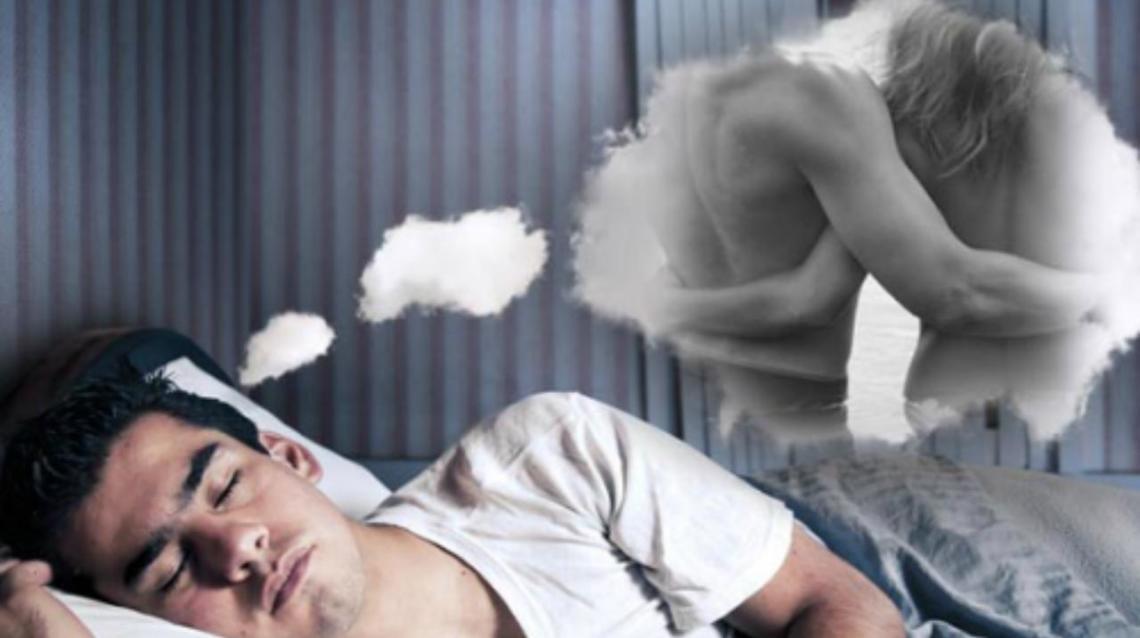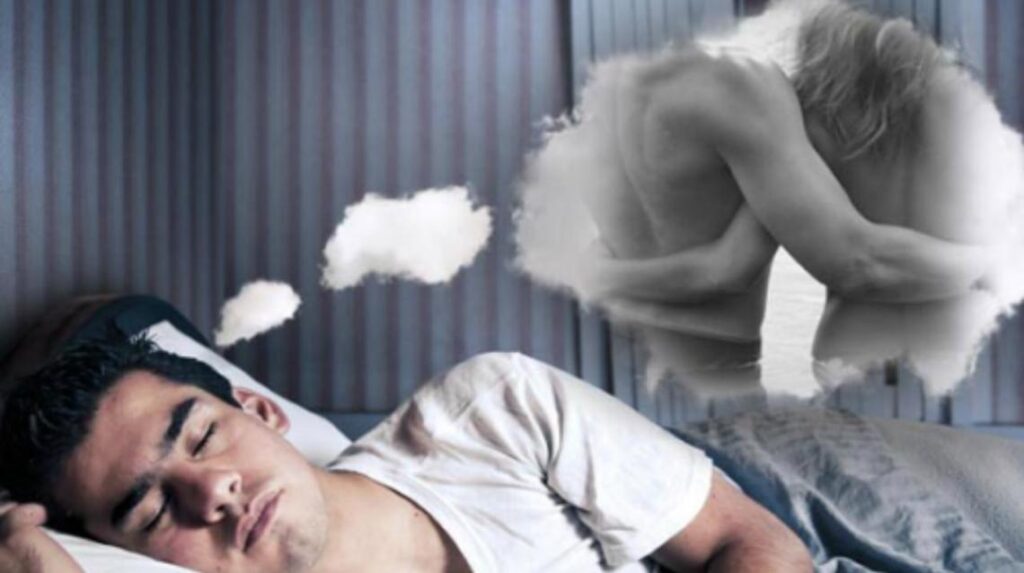How to Stop Nightfall and Enjoy a Peaceful Sleep

Understanding nightfall and its impact on sleep

Nightfall, also known as nocturnal emission or wet dream, is a natural occurrence that happens during sleep. It primarily affects males and involves the involuntary ejaculation of semen. While some individuals may worry or feel embarrassed about experiencing nightfall, it is important to understand that it is a normal bodily function and is not considered harmful or abnormal.
Nightfall usually occurs during periods of REM (rapid eye movement) sleep, which is the stage of sleep associated with vivid dreaming. It is believed to be a result of sexual thoughts or stimulation during sleep, which can trigger the release of semen. It is important to note that nightfall is not controllable and cannot be prevented while sleeping.
The impact of nightfall on sleep can vary from person to person. For some individuals, it may lead to a disturbance in sleep, causing them to wake up in the middle of the night. This can result in feelings of fatigue or drowsiness during the day. However, for most individuals, nightfall does not significantly affect the overall quality of sleep. It is essential to understand that nightfall is a normal physiological process and should not be a cause for concern unless it becomes persistent or accompanied by other symptoms. In the following sections of this article, we will delve deeper into potential causes of nightfall and explore strategies to promote better sleep quality.
Identifying potential causes of nightfall
Nightfall, also known as nocturnal emission or wet dream, refers to the involuntary discharge of semen during sleep. While it is a common experience for most men, understanding the potential causes can help shed light on this natural phenomenon. Hormonal changes during adolescence, when testosterone levels increase significantly, are often cited as a primary cause of nightfall. The excess semen produced during this time may be released through wet dreams. Similarly, nightfall can also occur in adults as a result of prolonged periods of sexual abstinence or infrequent sexual activity. The body may naturally release excess semen during sleep to maintain reproductive health.
Aside from hormonal changes and sexual habits, there are other factors that may contribute to nightfall. Psychological factors such as stress, anxiety, or certain medications may play a role in its occurrence. Additionally, engaging in sexual fantasies or exposure to sexually arousing stimuli before sleep can increase the likelihood of experiencing a wet dream. While nightfall is a normal part of sexual development and health, persistent or disruptive occurrences may warrant further investigation and medical advice. It is important to consider individual circumstances and overall well-being when exploring potential causes of nightfall.
Exploring the relationship between nightfall and sleep quality
Nightfall, also known as nocturnal emissions or wet dreams, is a natural physiological response that occurs during sleep in males. While some individuals may experience nightfall occasionally without any significant impact on their sleep quality, others may find it disruptive and disturbing. The relationship between nightfall and sleep quality is an important aspect to explore as it can provide insights into better understanding and managing this phenomenon.
Research suggests that nightfall does not necessarily affect the overall sleep quality of most individuals. However, it may lead to arousal or awakening during the occurrence, causing brief interruptions in the sleep cycle. These interruptions, although momentary, can disrupt the natural progression of sleep stages, potentially impacting the overall quality and restfulness of sleep. It is important to explore the relationship between nightfall and sleep quality to gain a comprehensive understanding of how nightfall can potentially influence our sleep patterns. By doing so, we can develop effective strategies to mitigate its impact and ensure better overall sleep quality for individuals experiencing nightfall.
Establishing a regular sleep schedule to promote better rest
A regular sleep schedule plays a crucial role in promoting better rest and overall sleep quality. When we establish a consistent bedtime routine, our bodies learn to anticipate and prepare for sleep at a specific time each night. This helps regulate our internal clock, also known as the circadian rhythm, which in turn promotes better sleep-wake patterns.
Maintaining a regular sleep schedule involves going to bed and waking up at the same time every day, even on weekends. This consistency allows our bodies to adapt and optimize our sleep cycles, resulting in more restful and rejuvenating sleep. Additionally, it is beneficial to create a sleep-friendly environment, free from distractions and excessive noise, to further enhance sleep quality. By adhering to a regular sleep schedule, we can improve our sleep efficiency, reduce wakefulness during the night, and wake up feeling refreshed and energized.
In conclusion, establishing a regular sleep schedule is key to promoting better rest. By maintaining a consistent bedtime routine and creating a sleep-friendly environment, we can optimize our sleep-wake patterns and improve overall sleep quality. Implementing these habits assists in regulating our internal clock and ensuring a restful night’s sleep.
• A regular sleep schedule helps regulate our internal clock and promotes better sleep-wake patterns.
• Going to bed and waking up at the same time every day, even on weekends, optimizes our sleep cycles.
• Creating a sleep-friendly environment free from distractions and excessive noise enhances sleep quality.
• Adhering to a regular sleep schedule improves sleep efficiency and reduces wakefulness during the night.
• By establishing a consistent bedtime routine, we can wake up feeling refreshed and energized.
Creating a calming bedtime routine to reduce nightfall occurrences
A calming bedtime routine can be extremely beneficial in reducing nightfall occurrences and promoting better sleep. One key component of this routine is to establish a consistent sleep-wake schedule. Going to bed and waking up at the same time every day helps regulate the body’s internal clock, making it easier to fall asleep and stay asleep throughout the night. By adhering to this schedule, the body learns to anticipate sleep, reducing the likelihood of experiencing nightfall.
In addition to a regular sleep schedule, it is important to create a relaxing environment before bedtime. This can include engaging in activities that promote relaxation, such as reading a book, taking a warm bath, or practicing deep breathing exercises. These activities help to calm the mind and ease any tension or anxiety that may contribute to nightfall. By incorporating these calming practices into your bedtime routine, you are setting the stage for a peaceful and uninterrupted night’s sleep.
Avoiding stimulants and heavy meals before bedtime
When it comes to promoting better sleep, one of the key factors to consider is avoiding stimulants and heavy meals before bedtime. Stimulants such as caffeine and nicotine can interfere with your ability to fall asleep and stay asleep. These substances can increase alertness and make it more difficult for your body to wind down and relax. It is advisable to limit the consumption of stimulants in the evening, particularly within a few hours of your desired bedtime.
Additionally, heavy meals before bedtime can disrupt your sleep quality. Digesting a large meal requires more effort from your digestive system, which can lead to discomfort and indigestion that may interfere with your ability to sleep soundly. It is recommended to have lighter meals in the evening and to allow sufficient time for digestion before going to bed. This helps prevent nighttime digestive issues and promotes a more restful sleep.
By making conscious choices to avoid stimulants and heavy meals before bedtime, you can create a sleep-friendly environment that supports better rest. This simple lifestyle adjustment can contribute to improved sleep quality and overall well-being.
Incorporating relaxation techniques such as meditation or deep breathing exercises
Relaxation techniques, including meditation and deep breathing exercises, have shown promise in promoting better sleep and reducing the occurrence of nightfall. These practices help to calm the mind and relax the body, allowing for a more restful and uninterrupted sleep experience.
Meditation, a practice that involves focusing one’s attention and eliminating the stream of thoughts, has been found to reduce stress and anxiety, which can often contribute to nightfall. By incorporating regular meditation into your daily routine, you may experience improved sleep quality, decreased nightfall occurrences, and an overall sense of calm and well-being.
Deep breathing exercises, such as diaphragmatic breathing or “belly breathing,” can also be effective in promoting relaxation and better sleep. These exercises involve taking slow, deep breaths, allowing the belly to rise with each inhale and fall with each exhale. Deep breathing helps to activate the body’s relaxation response and can lead to a more relaxed state before bedtime.
Incorporating these relaxation techniques into your nightly routine can have a significant impact on reducing nightfall and improving sleep quality. By dedicating time each day to practice meditation or deep breathing exercises, you can create a sense of calm and relaxation that can promote a more restful night’s sleep.
Maintaining a comfortable sleep environment conducive to restful sleep
Creating a comfortable sleep environment is crucial for ensuring restful sleep. One key factor to consider is the temperature of the room. It’s recommended to keep the bedroom cool, ideally between 60-67 degrees Fahrenheit (15-19 degrees Celsius). Lower temperatures help facilitate sleep by promoting the release of melatonin, a hormone that regulates sleep. Additionally, using breathable bedding made from natural fibers like cotton or bamboo can enhance comfort and aid in body temperature regulation.
Another important aspect is the level of noise in the bedroom. Excessive noise can disrupt sleep and cause frequent awakenings throughout the night. Using earplugs, a white noise machine, or even a fan can help to drown out unwanted noise and create a more serene sleeping environment. It may also be beneficial to address any potential sources of noise, such as a loud alarm clock or outside disturbances, to minimize disruption to sleep.
Implementing stress management strategies to prevent nightfall disturbances
Stress is a common factor that can disrupt our sleep patterns, causing disturbances such as nightfall. Nightfall, also known as nocturnal emission or wet dreams, refers to the involuntary ejaculation of semen during sleep. While it is a normal and natural occurrence for both males and females, frequent or excessive nightfall can lead to sleep disturbances and impact overall sleep quality.
To prevent nightfall disturbances, implementing effective stress management strategies is crucial. Chronic stress can trigger hormonal imbalances in the body, leading to increased sexual stimulation and the occurrence of nightfall. Engaging in stress-reducing activities like regular exercise, meditation, and deep breathing exercises can help regulate hormone levels and promote a more relaxed state of mind. These techniques have been shown to decrease stress hormone levels and improve sleep quality, reducing the likelihood of nightfall occurrences.
Additionally, creating a mindful and calming bedtime routine can contribute to preventing nightfall disturbances. Establishing a regular sleep schedule and avoiding stimulants and heavy meals before bedtime can help regulate the body’s natural sleep-wake cycle and promote better rest. Moreover, maintaining a comfortable sleep environment, free from distractions and disruptions, can further enhance sleep quality and reduce the likelihood of nightfall. By incorporating these stress management strategies into daily life, individuals can take proactive steps to prevent nightfall disturbances and achieve a more restful sleep.
Engaging in regular physical exercise to improve sleep quality
Regular physical exercise has long been associated with numerous health benefits, and its positive impact on sleep quality is no exception. Engaging in regular physical activity not only helps to alleviate symptoms of insomnia but also contributes to a more restful and rejuvenating slumber.
Research has consistently shown that incorporating exercise into your daily routine can lead to improved sleep patterns. Regular exercise promotes the release of endorphins, often referred to as the body’s natural mood enhancers, which can help to reduce feelings of stress and anxiety that often disrupt sleep. Additionally, physical activity increases the production of adenosine, a chemical in the brain that helps regulate sleep-wake cycles, resulting in a more balanced and harmonious sleep schedule.
Moreover, engaging in regular exercise has been found to increase the overall duration of deep sleep, also known as slow-wave sleep. This stage of sleep is critical for the restoration and repair of bodily functions, including muscular recovery and memory consolidation. By incorporating moderate-intensity aerobic exercise, such as brisk walking or cycling, into your daily routine, you can enhance the quality and duration of your sleep, leaving you feeling refreshed and energized upon awakening.
In summary, regular physical exercise not only positively impacts various aspects of our physical health but also plays a significant role in improving sleep quality. By incorporating moderate-intensity aerobic activities into our daily routines, we can reap the benefits of enhanced deep sleep, reduced stress and anxiety, and overall improved sleep patterns. So, lace up your sneakers and prioritize regular exercise to promote a more restful and rejuvenating night’s rest.
Seeking medical advice for persistent nightfall issues
Persistent nightfall, also known as nocturnal emissions or wet dreams, refers to the unintentional release of semen during sleep. While occasional nightfall is considered normal and not a cause for concern, frequent or persistent nightfall can be distressing and impact overall well-being. If you are experiencing persistent nightfall, it may be beneficial to seek medical advice to identify the underlying causes and explore potential treatment options.
One of the primary reasons to consult a medical professional for persistent nightfall is to rule out any underlying medical conditions. Various factors such as hormonal imbalances, infections, or abnormalities of the reproductive system can contribute to excessive semen release during sleep. A healthcare provider can conduct a thorough evaluation, including a comprehensive medical history, physical examination, and possibly recommend additional tests if necessary. Identifying the root cause is crucial for developing an appropriate treatment plan tailored to your specific needs.
Furthermore, seeking medical advice allows you access to expert guidance and personalized recommendations. A healthcare professional with expertise in male reproductive health can provide valuable insights into managing persistent nightfall. They may suggest lifestyle modifications, nutritional adjustments, or specific exercises that can potentially help regulate semen release during sleep. Additionally, they can address any concerns or anxieties you may have, offering reassurance and counseling on healthy sexual habits.
Remember, discussing sensitive topics such as persistent nightfall with a medical professional is an essential step towards understanding and addressing this issue. Seeking their guidance can lead to a thorough evaluation of your condition, the identification of potential underlying causes, and the development of a personalized treatment plan to alleviate the distress caused by persistent nightfall.
Considering the role of medication or therapy in managing nightfall
Medication or therapy can play a crucial role in managing nightfall, particularly when it becomes a persistent issue. In some cases, doctors may prescribe certain medications to help control the frequency of nightfall. For instance, selective serotonin reuptake inhibitors (SSRIs) such as fluoxetine or paroxetine have been found to be effective in reducing the occurrence of nightfall. These medications work by increasing serotonin levels in the brain, which in turn helps regulate the ejaculatory reflex and prevent accidental release of semen during sleep.
In addition to medication, therapy can also be beneficial in managing nightfall. Cognitive behavioral therapy (CBT) is often recommended as a first-line treatment for individuals experiencing frequent nightfall. This form of therapy helps patients understand and correct any negative thought patterns or behaviors that may be contributing to their nightfall experiences. By addressing underlying psychological factors such as anxiety or stress, CBT can ultimately lead to a reduction in the occurrence of nightfall. It is important to consult with a healthcare professional to determine the most appropriate treatment approach based on individual needs and circumstances.
Exploring natural remedies or alternative therapies for nightfall prevention
Nightfall, also known as nocturnal emission or wet dream, is a common occurrence that affects many individuals, particularly males. While it is a natural bodily process and not considered harmful, some individuals may experience discomfort or disruption in their sleep patterns due to frequent nightfall episodes. As a result, exploring natural remedies or alternative therapies for nightfall prevention has gained attention.
One potential natural remedy for nightfall prevention is the use of herbal supplements. Certain herbs, such as ashwagandha, shatavari, and safed musli, have been traditionally used in Ayurvedic medicine to promote overall reproductive health and balance. These herbs are believed to have adaptogenic properties, helping to reduce stress and maintain hormonal equilibrium in the body. However, it is important to note that scientific evidence supporting the effectiveness of these herbal supplements specifically for nightfall prevention is limited, and more research is needed to validate their claims.
Another alternative therapy that individuals may consider is acupuncture. Derived from traditional Chinese medicine, acupuncture involves the insertion of thin needles into specific points on the body. Proponents of acupuncture believe that it can help regulate energy flow and address imbalances that may contribute to nightfall. While there is some anecdotal evidence suggesting the potential benefits of acupuncture for various sexual dysfunctions, including nightfall, rigorous scientific studies to confirm its effectiveness are still lacking.
Please note that while natural remedies and alternative therapies may be worth considering for nightfall prevention, it is always advisable to consult with a healthcare professional or specialist before starting any new treatment. They can provide appropriate guidance based on your individual circumstances and medical history to ensure safe and effective management of nightfall.
Embracing a positive mindset and adopting healthy sleep habits for long-term success.
To embrace a positive mindset and adopt healthy sleep habits for long-term success, it is important to prioritize self-care and establish a consistent bedtime routine. This routine should incorporate relaxing activities that promote a sense of calm before sleep. Consider incorporating techniques such as meditation or deep breathing exercises into your routine to help calm the mind and prepare for restful sleep.
In addition to a bedtime routine, creating a comfortable sleep environment is crucial for improving sleep quality. Ensure your bedroom is cool, quiet, and free from distractions that could disrupt your sleep. Invest in a supportive mattress and pillows that align with your personal comfort preferences. You may also find it helpful to use blackout curtains or an eye mask to create a dark environment that promotes better sleep.
By embracing a positive mindset and adopting healthy sleep habits, you can significantly improve your sleep quality and overall well-being. Prioritizing self-care and establishing consistent sleep routines can help you achieve long-term success in obtaining restful and rejuvenating sleep. Remember, maintaining healthy sleep habits requires dedication and commitment, but the rewards are well worth the effort.
What is nightfall and how does it impact sleep?
Nightfall, also known as nocturnal emissions or wet dreams, refers to involuntary ejaculation or orgasm during sleep. It can disrupt sleep quality and lead to feelings of discomfort or embarrassment upon waking.
What are some potential causes of nightfall?
Nightfall can be caused by various factors such as sexual arousal, hormonal changes, and the accumulation of semen in the body. It may also occur as a result of sexual dreams or fantasies.
How does nightfall affect sleep quality?
Nightfall can interrupt the sleep cycle, leading to fragmented sleep and reduced overall sleep quality. It may cause feelings of fatigue, grogginess, or restlessness upon waking.
How can I establish a regular sleep schedule to promote better rest?
To establish a regular sleep schedule, try to go to bed and wake up at the same time every day, including weekends. Consistency helps regulate your body’s internal clock and promotes better sleep.
What can I do to create a calming bedtime routine to reduce nightfall occurrences?
A calming bedtime routine can include activities such as reading a book, taking a warm bath, practicing relaxation exercises, or listening to soothing music. These activities can help relax the mind and prepare the body for sleep.
Should I avoid stimulants and heavy meals before bedtime to prevent nightfall?
Yes, it is recommended to avoid stimulants like caffeine or nicotine within a few hours of bedtime, as they can interfere with sleep. Additionally, consuming heavy meals close to bedtime can cause discomfort and disrupt sleep.
What relaxation techniques can I incorporate to reduce nightfall occurrences?
Relaxation techniques such as meditation, deep breathing exercises, or progressive muscle relaxation can help reduce stress and promote a calmer state of mind before sleep, potentially reducing the occurrence of nightfall.
How can I maintain a comfortable sleep environment conducive to restful sleep?
Ensure your sleep environment is dark, quiet, and at a comfortable temperature. Use comfortable bedding and pillows that support good sleep posture. Minimize external disruptions, such as noise or light, to create an ideal sleep environment.
What stress management strategies can I implement to prevent nightfall disturbances?
Engaging in stress management techniques such as practicing mindfulness, journaling, or seeking therapy can help reduce stress levels and prevent disturbances like nightfall. Finding healthy outlets for stress can contribute to better sleep quality.
Can regular physical exercise improve sleep quality and reduce nightfall occurrences?
Yes, regular physical exercise has been shown to improve sleep quality. Engaging in moderate-intensity exercise earlier in the day can help regulate sleep patterns, reduce stress, and potentially decrease the frequency of nightfall.
When should I seek medical advice for persistent nightfall issues?
If you are experiencing persistent or bothersome nightfall issues that significantly affect your sleep quality or overall well-being, it is recommended to consult a healthcare professional for further evaluation and guidance.
Can medication or therapy play a role in managing nightfall?
Depending on the underlying causes and severity of nightfall, medication or therapy may be recommended by healthcare professionals. They can help address any underlying physical or psychological factors contributing to nightfall.
Are there any natural remedies or alternative therapies that can help prevent nightfall?
Some natural remedies or alternative therapies, such as herbal supplements, yoga, or acupuncture, have been suggested to help manage nightfall. However, it is important to consult with a healthcare professional before trying any alternative treatments.
How does embracing a positive mindset contribute to long-term success in managing nightfall?
Embracing a positive mindset can help reduce stress and anxiety surrounding nightfall, promoting a healthier sleep mindset. It can empower individuals to adopt healthy sleep habits and seek appropriate solutions, ultimately leading to long-term success in managing nightfall.






